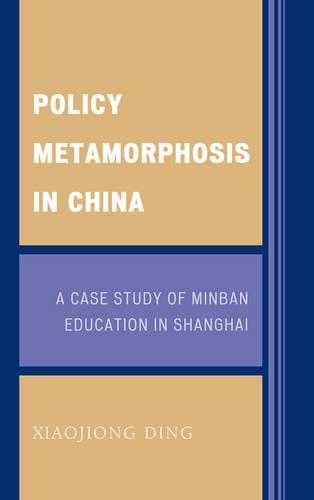
Policy Metamorphosis in China: A Case Study of Minban Education in Shanghai
(Hardback)
Publishing Details
Policy Metamorphosis in China: A Case Study of Minban Education in Shanghai
By (Author) Xiaojiong Ding
Bloomsbury Publishing PLC
Lexington Books
1st December 2011
United States
Classifications
Professional and Scholarly
Non Fiction
Comparative politics
Central / national / federal government policies
371.02095
Physical Properties
Hardback
260
Width 162mm, Height 23mm, Spine 240mm
544g
Description
China has been experiencing great economic and social changes since the late 1970s when the Reform and Opening-Up policies were accepted. While some Sinologists argue that such changes have made the Chinese structure of authority fragmented and discrepant, and have weakened the directive power of the Central Government, a few others emphasize that despite a certain degree of economic decentralization and segmentation of public power, the Central Government has been seeking ways to hold the nation together. Consequently, while the former argue that due to the centrifugal nature of the political system, policy implementation is bound to deviate from the route specified by the Central Government, the latter hold that national policies are carried out faithfully, with minor deviations only in certain circumstances.
This book studies the processes of policy implementation in contemporary mainland China by taking minban/private education at the level of basic education in Shanghai as an example. Based on 65 interviews conducted during 2001 and 2004, three moduses of policy implementation are proposed, and the Model of Structural Fracturation is advanced as the prevailing modus of policy implementation in contemporary China. The model argues that policy metamorphosis during implementation is not something random; in contrast, it is determined by structural factors that no single policy actor can manipulate. The pyramid of Chinese politics is a loose construction, with vertical and horizontal fracturations between different layers. The model highlights the fact that governments at the county/district level are remote from and beyond the control of the Central Government and the provinces. They deserve more attention than they have received.
Contrary to Western perspectives which regard the structural fracturation in the Chinese polity as dangerous for national stability and unity, this book takes the fracturation as an important and delicate element of the Chinese mode of governance, and suggests that the very strength of the state lies in its capacity to tolerate local deviation and to embrace it into national institutions.
Reviews
Ding's work is an unusual contribution to the literature about contemporary China. Using private education policies in Shanghai as a microcosm, and with a wealth of field data, she delineates a typical policy processes in China. The book explains some of the major puzzles about China held by those who are outside the system. In particular, she has uncovered the paradox between the apparent distortions during policy implementation on the one hand, and the general progress achieved by such policies on the other. Ding's work starts a new perspective of understanding China. -- Kai-ming Cheng, University of Hong Kong
This closely researched study of private schooling should interest those interested not only in Chinese education but also in Chinese policy implementation. -- Daniel Levy, SUNY Distinguished Professor, University at Albany
The book is based on a well-designed qualitative study with 65 in-depth interviews in 2001 and 2004. Ding tries to figure out the logic of policy implementation in Shanghai as an insider while having a clear awareness of the dilemma of studying a policy issue in her own culture. She makes the best use of her identity as an insider, not only as a Chinese but as someone who knows some inside stories concerning the issue interviewed. * Frontiers of Education in China *
Author Bio
Xiaojiong Ding is associate professor at the Shanghai Academy of Educational Sciences. She serves as key member of the Center for International Education Study at the Ministry of Education and vice chairperson of the Academic Board of the Institute of Higher Education, and is member of the Shanghai Association of Comparative Education. She participates actively in educational policy making at the national and municipal levels. Among other works, Ding was one of the chief editors of Focusing on the Legislation of Minban Education (Beijing: Educational Sciences, 2001), and member of the editorial review board of Green Book of Education in China 2001 (Beijing: Educational Sciences, 2001). She has also published about sixty articles and book chapters on private and minban education, educational policies, policy implementation, and international and comparative education, including the journal of The China Quarterly and the Journal of Contemporary China.
